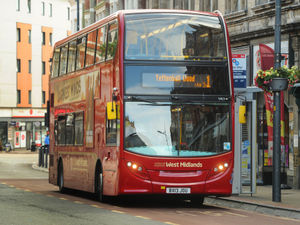Foundry jobs loss misery
Several of the workers at Hitachi's Hercunite Foundry in Tipton today face the prospect of losing the same job twice.
 Several of the workers at Hitachi's Hercunite Foundry in Tipton today face the prospect of losing the same job twice.
Several of the workers at Hitachi's Hercunite Foundry in Tipton today face the prospect of losing the same job twice.
Just four years ago there were tears as more than 300 jobs were axed in the closure of the foundry, then owned by US firm Grede.
People who had worked at the plant for decades walked out the factory gates with their last pay cheque in February 2003.
And yet there was the promise of a new hope just 18 months later when Japanese corporation Hitachi bought the site and invested tens of millions of pounds in its new hi-tech Hercunite Foundry.
Up to 100 people were subsequently taken on, many of them former Grede staff. Today they face the prospect of losing their jobs all over again after Hitachi's decision to close the foundry by the end of March next year.
The Sedgley Road East foundry has been the site of traditional Black Country metal working for well over half a century.
Originally owned by Duport, it absorbed the historic John Harper & Co lockmaking business, set up in Willenhall in 1790, following a takeover in 1974 and a consolidation of factories onto the one site in 1982.
The Tipton foundry had already played a major role in the future shape of the Black Country by being one of the first businesses to recruit large numbers of immigrant Indian workers in the early 1960s.
Duport Harper continued as the one of the biggest foundries in the West Midlands, employing more than 400 people, and seemed to have survived the recession of the early 1990s in good shape.
It was producing nearly 35,000 tonnes of grey iron and ductile castings a year when, in 1996, it was bought by engineering group Haden Maclellan. Just 18 months later it was bought again, this time by the Wisconsin firm Grede Foundries Inc of Milwaukee.
But in 2002, after four years without a pay rise and the axing of 150 jobs, the workforce voted for a strike after their wages were cut by up to 40 per cent. The month after the July strike Grede announced it was closing the site, blaming cut-price competition from China and India.
The decision of Hitachi to buy the site and build a new foundry in 2004 was seen as the birth of a bright new dawn for the Black Country's metalworkers. But the soaring price of specialist metals, changing technology and ruthless Japanese management now spells the end for what had been one of the region's most modern foundries.
Today John Parker, chief executive of the West Bromwich-based Cast Metals Federation - which represents 200 castings and foundry firms nationwide - said: "We are very disappointed to see the closure of one of the newest foundries in the industry.
"The high price of nickel, cobalt, chromium and other metals has been a problem for some time, and it is difficult for companies to get the automotive customers they supply to accept higher prices.
"We will have to wait and see whether anyone can now step in to buy the business."
By Simon Penfold





